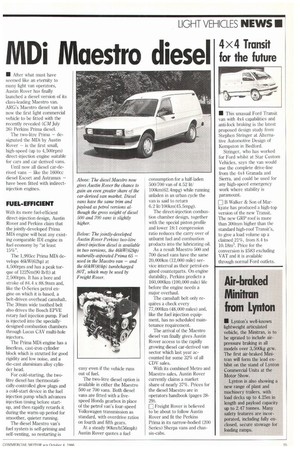FUEL-EFFICIENT
Page 27

If you've noticed an error in this article please click here to report it so we can fix it.
With its more fuel-efficient direct-injection design, Austin Rover and Perkins claim that the jointly-developed Prima MDi engine will beat any existing comparable IDI engine in fuel economy by "at least 15%".
The 1,993cc Prima MDi develops 46kW(62hp) at 4, 50Orpm and has a peak torque of 122Nm(90 lb/ft) at 2,500rpm. It has a bore and stroke of 84.4 x 88.9min and, like the 0-Series petrol engine on which it is based, a belt-driven overhead camshaft. The 30mrn wide toothed belt also drives the Bosch EPVE rotary fuel injection pump. Fuel is injected into the speciallydesigned combustion chambers through Lucas CAV multi-hole injectors.
The Prima MDi engine has a linerless, cast-iron cylinder block which is strutted for good rigidity and low noise, and a die-cast aluminium alloy cylinder head.
For cold-starting, the twolitre diesel has thermostatically-controlled glow plugs and a cold-start device in the fuel injection pump which advances injection timing before startup, and then rapidly retards it during the warm-up period for smoother, quieter running.
The diesel Maestro van's fuel system is self-priming and self-venting, so restarting is easy even if the vehicle runs out of fuel.
The two-litre diesel option is available in either the Maestro 500 or 700 vans. Both diesel vans are fitted with a fivespeed Honda gearbox in place of the petrol van's four-speed Volkswagen transmission as standard, with overdrive ratios on fourth and fifth gears.
At a steady 90km/h(56mph) Austin Rover quotes a fuel consumption for a half-laden 500/700 van of 4.52 lit/ 100km(62. 4mpg) while running unladen in an urban cycle the van is said to return 6.2 litilOOkm(45. 5mpg).
The direct-injection combustion chamber design, together with the special piston profile and lower 18:1 compression ratio reduces the carry over of unbund fuel and combustion products into the lubricating oil.
As a result Maestro 500 and 700 diesel vans have the same 20,000km (12,000 mile) service interval as their petrol-engined counterparts. On engine durability, Perkins predicts a 160,000km (100,000 mile) life before the engine needs a major overhaul.
The camshaft belt only requires a check every 77,000km (48,000 miles) and, like the fuel injection equipment, has no scheduled maintenance requirement.
The arrival of the Maestro diesel van finally gives Austin Rover access to the rapidly growing diesel car-derived van sector which last year accounted for some 32% of all CDV sales.
With its combined Metro and Maestro sales, Austin Rover currently claims a market share of nearly 37%. Prices for the diesel Maestro are in operators handbook (pages 2829).
Freight Rover is believed to be about to follow Austin Rover and fit the Perkins Prima in its narrow-bodied (200 Series) Sherpa vans and chassis-cabs.








































































































































